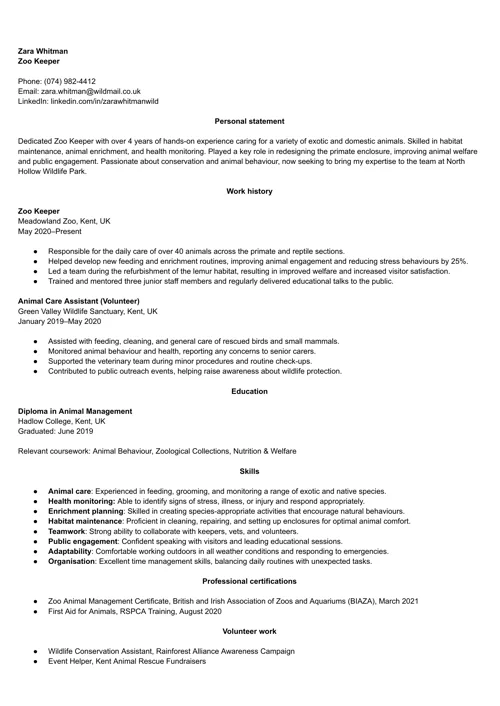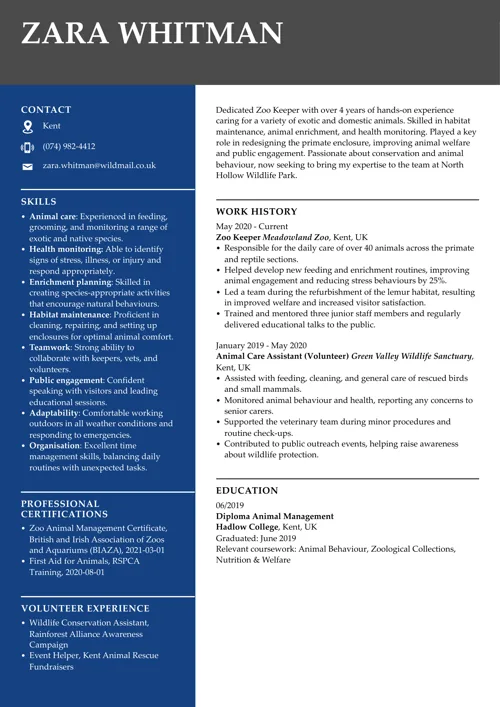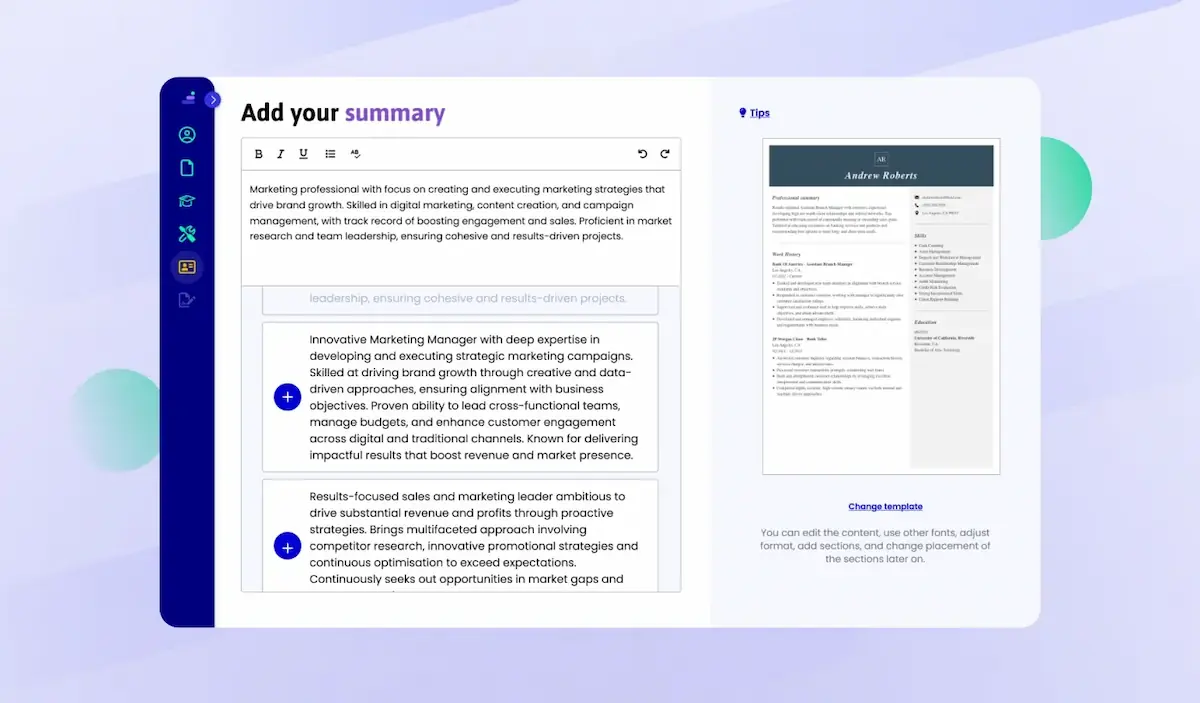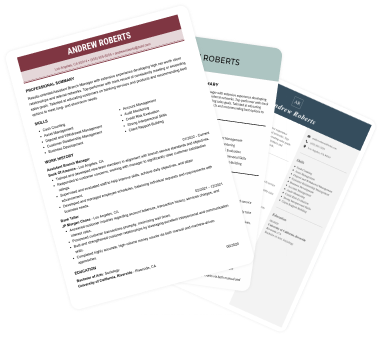Create a professional CV now!
 NO
NO YES
YESLast updated on 29 December, 2025

Our customers have been hired by*:
Looking to stand out in your next job interview? It’s not just about having the right answers—it’s about knowing what kind of questions to expect. Situational interview questions are designed to uncover how you think on your feet, solve problems, and handle real-world challenges on the job.
In this article, I’ll break down what situational interview questions are, why employers love them, and how you can prepare with strong examples that showcase your skills and experience.
Create an effective CV in minutes. Choose a professional CV template and fill in every section of your CV in a flash using ready-made content and expert tips.
Create a professional CV now!
 NO
NO YES
YESWe created the sample on the left using our builder. See other good CV examples like this one.
Looking for more career advice? Have a look at these guides:
Situational interview questions appear during a job interview to assess how you would handle specific work scenarios. They help employers understand your problem-solving, communication, and decision-making skills in situations you might face in the role, often based on hypothetical challenges.
Situational interview questions test how you would respond to real-life challenges in the workplace. To answer them effectively, use the STAR method: Situation, Task, Action, and Result. This structured approach helps you stay focused and give complete, relevant answers. Choose examples from the past that reflect the skills needed for the job you’re applying for, ideally from similar roles or work types. When you tailor your responses, you prove that you understand the company’s needs and the value you bring.
Start by outlining the context of your example. Mention where and when it happened, and what your role was at the time. Include only the necessary background to help the interviewer understand the scenario. Choose a situation that aligns with the job you’re applying for. This allows the interviewer to relate your experience to their workplace and actual requirements.
Describe what you were responsible for in the situation. Focus on your role specifically, not the team’s. This is your opportunity to demonstrate that you understand accountability and can take the initiative. Clearly state the goal or challenge you were expected to deal with. This provides a logical lead-in to the next part of your answer.
Describe the steps you took to address a specific situation. Highlight your approach to problem-solving, teamwork, and effective communication. Explain why you chose these actions and how you implemented them. Keep the focus on your contribution, even if others were involved as well. This helps show your decision-making process and leadership potential.
Finish with the outcome of your actions. Use specific, measurable results whenever possible, such as improved performance or increased efficiency. If the results weren’t quantifiable, describe the positive impact in another way. Mention any feedback you received and lessons learned. This shows that you can reflect on your work and grow from experience.
A strong CV summary will convince the recruiter you’re the perfect candidate. Save time and choose a ready-made personal statement written by career experts and adjust it to your needs in the LiveCareer CV builder.

As you already know, situational interview questions help employers understand how you might behave in specific contexts. These questions are mostly designed to evaluate your soft skills, but also how you apply your work experience and judgement under pressure.
Below, I’ve grouped 15 common situational interview questions to give you a clear idea of what you might face in an interview. Each question is followed by a sample answer using the START method explained above to help you prepare your responses.
Handling challenging situations at work is a skill employers highly value. It shows your resilience, ability to stay calm under pressure, and clear thinking. It also proves you can find solutions even when things get tough.
Interviewers ask this question to assess how you manage interpersonal challenges in a professional situation. They want to know if you can resolve conflicts calmly and effectively, without increasing tension or causing further misunderstandings.
Sample answer: In my previous job, I was co-leading a project with a colleague who disagreed strongly about our strategic approach. My task was to ensure that we delivered a cohesive plan without weakening our working relationship. I initiated a private and respectful conversation to understand their concerns and shared my perspective politely. We found common ground by merging elements of both approaches. I then prepared a revised proposal and outlined key responsibilities for each of us. As a result, our final submission was praised by the executive team, and our rapport significantly improved.
This question tests your customer service skills, empathy, and ability to stay calm and proactive in stressful situations.
Sample answer: When a client received a product that didn’t meet their expectations, I took responsibility for resolving the situation as soon as possible. I listened empathetically to their concerns, apologised for the inconvenience, and arranged a replacement shipment at no extra cost. Additionally, I offered a small credit for their next order. Then, I followed up continuously until the new product arrived, ensuring they were happy with it. The client later provided positive feedback, noting how valued they felt, and continued to place orders with regularity.
Employers want to know if you take ownership of your mistakes and oversights and what steps you take to correct and learn from them.
Sample answer: In one instance, I sent an outdated version of our brochure to a prospective client. I realised the error a few minutes later. My first action was to notify my manager and call the client to explain the mix-up and apologise. I sent the correct version straight away and offered a discount on our products and services as a gesture of goodwill. Then I reviewed our document control process and introduced an additional sign-off step. This change has since prevented similar errors, and we’ve maintained consistently strong and positive client relationships.
Managing pressure and meeting deadlines are important in any workplace. Employers want to see that you can stay focused, productive, and show strong organisational skills, even when time is tight or expectations are high. This section examines how you approach these challenges with confidence.
This helps employers understand your time management and prioritisation skills in high-pressure situations.
Sample answer: As part of a product launch team, I received a last-minute request to produce a detailed product manual within 48 hours. My responsibility was to turn around the content and visual layout. I began by mapping out the scope, prioritising critical sections, and collaborating with the design team to align on layouts quickly. I worked through the night and conducted thorough proofreading before the morning deadline. The manual was approved on time, received positive internal reviews, and contributed to a smooth product rollout with minimal support issues and complications.
When asking this question, employers want to evaluate your organisational skills and your ability to stay productive without sacrificing quality.
Sample answer: I once managed three key social media campaigns that all needed to launch simultaneously. As campaign lead, I was responsible for coordinating content development, design, and scheduling. I created a detailed timeline, assigned tasks and responsibilities based on individual strengths, and established twice-daily check-ins to monitor progress. Whenever an obstacle arose, I reallocated resources and offered assistance to colleagues who needed help. The campaigns successfully launched together, achieved strong engagement, and boosted our overall channel performance by 20%.
This question gauges your self-awareness, stress management, and ability to communicate your limits effectively.
Sample answer: During a peak season, our team leader was unexpectedly out of office, doubling my workload overnight. My goal was to maintain high-quality work without burning out. I discussed the situation with senior management, prioritised essential tasks, and asked others on the team to help where possible. I also blocked out focused work time in my calendar and kept open communication with stakeholders about achievable completion dates. We met all commitments on schedule, and the managers acknowledged my ability to handle stress with composure.
Problem-solving and decision-making are key abilities that demonstrate how you approach challenges and choose the most effective course of action. Employers look for candidates who can think critically, analyse situations smartly, and make effective decisions that benefit the organisation.
Interviewers want to know how you weigh options, assess risk, and act decisively when faced with tough choices.
Sample answer: I was managing a software launch that had a core feature that was still buggy. Stakeholders wanted to proceed, but I was concerned about reliability. After analysing the risks, I met with the team to discuss possible fixes and then decided to delay the launch by one week to execute a patch. I communicated transparently with both stakeholders and team members. When we eventually launched, user adoption rates were firm, and support tickets remained low. My decision protected our reputation and reinforced trust with clients.
This question often arises to assess your resourcefulness and willingness to learn when faced with unfamiliar challenges.
Sample answer: When asked to assist with implementing a new analytics platform I’d never used, I had to learn quickly. I enrolled in online training, reviewed vendor documentation, and shadowed a peer who had prior experience. I also set up a test environment to run pilot reports. Within two weeks, I had built functional dashboards and presented findings to the team. They responded positively, and the new tool improved our decision-making process within just a month.
They want to see how you respond to possible setbacks and whether you can adapt your approach without losing motivation.
Sample answer: I once suggested streamlining our approval process to reduce turnaround times, but management rejected the suggestion due to concerns about compliance. My goal was to improve efficiency without compromising standards. I gathered feedback, analysed potential risks, and refined the proposal to include additional safeguards. I presented the enhanced plan, highlighting benefits and controls. It was approved, resulting in a 30% reduction in process time while maintaining compliance.
In today’s fast-paced work environment, adaptability is more important than ever. Employers want to know that you can adjust to new situations, embrace change, and stay effective when things shift unexpectedly. This type of question focuses on how to highlight your flexibility and resilience.
When recruiters ask this, they assess your flexibility and ability to adjust plans in response to changing circumstances.
Sample answer: Halfway through a website redesign project, the client requested a comprehensive e-commerce section added to the scope. My responsibility was to adjust our timeline and resources for this purpose. I conducted a scoping session with the team, recalculated effort, and negotiated revised deliverables with the client. I also secured two extra developer days and updated stakeholder communication plans. We delivered the enhanced site on time, and the client was so pleased they requested ongoing support.
Employers want to see whether you can step up when needed and handle newly assigned responsibilities.
Sample answer: When our team manager took sudden leave, I was asked to take over leadership duties. Although I had limited experience, I accepted the challenge and quickly drew up a brief plan to ensure continuity. I liaised with senior teams to clarify expectations and maintained daily team check-ins to ensure updates were provided. I also redistributed responsibilities based on individual strengths. Under my interim leadership, projects stayed on track and morale remained positive. Our higher management later commended me for my proactive approach.
This reveals your ability to acquire new skills quickly to respond to demands in a dynamic workplace.
Sample answer: I was assigned to set up automated reporting in Python, a skill I hadn’t yet mastered. I dedicated several evenings to online courses, practice exercises, and review sessions with a more experienced colleague. Over a few days, I developed a working script to fetch data, format it in Excel, and schedule email broadcasts. This automation saved the team four hours per week and reduced the chance of manual errors. Management praised both the quick learning and the cost-saving result.
Effective teamwork is at the heart of most successful organisations. Employers want to see that you can work well with others, communicate clearly, and contribute to shared goals.
They ask this to understand how well you adapt your working style and communicate with diverse team members.
Sample answer: In a collaborative project, I worked closely with a colleague who preferred extensive detail, while I lean towards big-picture planning. We recognised we needed complementary strengths. I asked them to handle granular specifics while I created the broader structure. We scheduled weekly syncs to align and adjusted content based on feedback. The result was a comprehensive and polished report that earned praise for both its depth and clarity. Our balanced partnership strengthened team dynamics going forward.
This question checks your empathy, cooperation, and sense of team responsibility.
Sample answer: A teammate was falling behind due to increased workload and personal stress. Sensing the pressure, I offered to help with some of their deliverables and encouraged them to delegate where possible. We met informally to discuss bottlenecks, and I provided guidance on simplifying the scope. I also arranged standing-up progress check-ins to monitor recovery. As a team, we completed the project on time. My teammate later thanked me for alleviating pressure and helping restore their confidence.
They want to know how you foster alignment and make decisions when collaborating within a team.
Sample answer: During an ideation session, the team split on which campaign concept to pursue. As project lead, I guided us through a structured review of the pros and cons of each idea. Then I conducted an anonymous vote to ensure all voices were heard without bias. Once we agreed on the most supported concept, I recorded the decision and mapped out the next steps. This helped everyone get on the same page quickly and gave the team a clearer sense of direction. The campaign launched with high confidence and outperformed the previous one in engagement.
You don’t have to be a CV writing expert. In the LiveCareer CV builder you’ll find ready-made content for every industry and position, which you can then add with a single click.

I hope this article has helped you feel more confident and prepared to tackle situational interview questions with clear, structured answers that showcase your strengths.
Our editorial team has reviewed this article for compliance with Livecareer’s editorial guidelines. It’s to ensure that our expert advice and recommendations are consistent across all our career guides and align with current CV and cover letter writing standards and trends. We’re trusted by over 10 million job seekers, supporting them on their way to finding their dream job. Each article is preceded by research and scrutiny to ensure our content responds to current market trends and demand.
Category: Career Advice
Crafting a job-winning CV is all about showcasing your unique skills and experiences. Start with a strong personal statement that highlights your career goals and achievements.
Try Our CV Builder Now